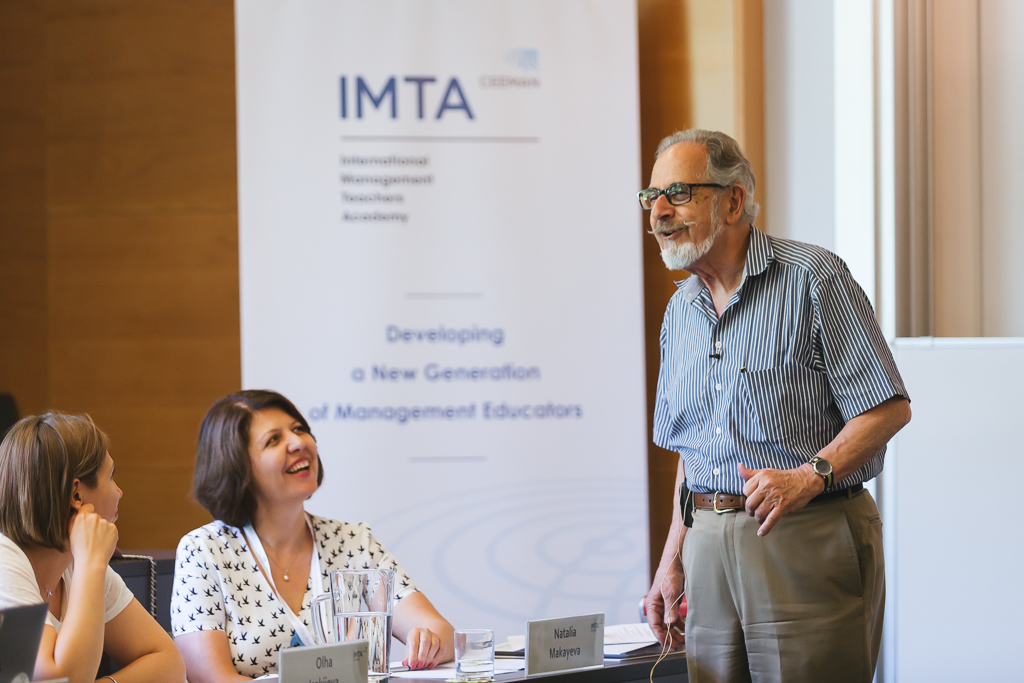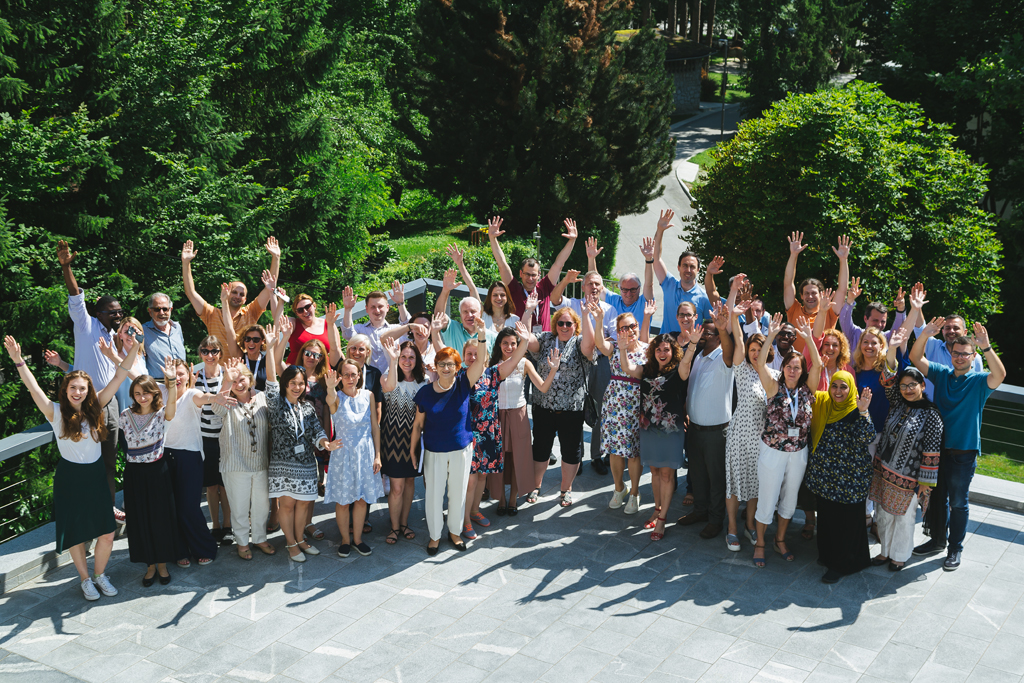Here are the reflections of Arshad Ahmad, Tony Buono, Jim Ellert, JB Kassarjian, Krzysztof Obłój, and Joe Pons on IMTA and faculty development in general.
On Business Schools’ Efforts for Faculty Development to Improve Their Customer Focus and Institutional Needs
 Krzysztof Obłój:
Krzysztof Obłój:
There are two components that make a good business school: one is very good students (and that is a crucial component); another is very good faculty. The problem is you cannot have the first without the other.
It was always the case that once you have very good teachers and very good academics, there will be better students. With better students, there is a motivation for teachers to develop - so called positive feedback. If you have very good teachers who are merging practice, theory, and teaching, you have good students, better teachers, and you have a better business school.
Joe Pons:
Developing faculty does not come cheap. People are not born with teaching skills but it is possible to teach people how to teach. In many schools, they take teaching skills for granted. In many PhD programs, even in very good and reputable institutions, there is absolutely no time and effort at all invested in training people in the kinds of skills that will help them make a good classroom performance. That is why an initiative like IMTA strikes at the very core of a need that more and more business schools have.
.jpg?sfvrsn=0) Jim Ellert:
Jim Ellert:
Management education is a growth industry. It has been growing rapidly over many years. As management educators, we add value in that we are sharpening the decision-making skills and attitudes of executives. However, many of us, certainly of my generation and that’s a large number of faculty, will be retiring, many over the next five years. So, it is now time to develop a new generation of faculty who are skilled in communicating complex management concepts, issues, and dilemmas in a simple, persuasive, practical, and relevant ways for executives. This is a major imperative for IMTA.
Is There an Ideal Profile for a Management Professor?
Krzysztof Obłój:
This is a tricky question. I think there are at least three separate approaches or models that address this question.
In the US, in a good school, the ideal professor is a researcher and nobody cares about how and what he or she teaches. This is because, if they do need very good teachers in executive courses for example, they can always hire excellent teachers from other schools, they can hire practitioners, use their global network, and in any case, some of their own people will teach very well anyway.
Here, in CEE and Russia, we were for many years at the other end of the spectrum. We believed that a good professor was someone who teaches very well and has practical experience. So we were doing consulting, improving our teaching skills, and we did not pay enough attention to research.
The third model was reflected in Western Europe where management professors were typically neither very good researchers nor very good teachers but they strived to achieve both.
To answer simply, an ideal professor has to solve a dilemma that is very difficult to unravel because of time and resource constraints. You have to be a good researcher (you have to train your brain and keep close to new concepts) but at the same time you have to be close enough to business practice to understand how to move theoretical and research-based concepts into the classroom.
If you can meet three requirements: cutting edge and influential research, practical insights that can inspire managers, and excellent teaching skills, you are an ideal professor. If you excel in two, it’s still ok. But, too many management professors excel in only one of these requirements.
 Joe Pons:
Joe Pons:
The ideal professor does not exist. An ideal professor would be a cocktail with a number of ingredients and I am not too sure on the precise amount of each ingredient since it depends on who tastes the cocktail – some might like it a little sweeter or a little bit bitter.
The components would probably include a lot of competence in their own specialization, a lot of first-hand business experience, mostly from consulting, particularly from direct strategic consulting with well-known institutions, quite a lot of research work that is somehow connected with both teaching and consulting, and teaching skills that make that person adaptable to very different student groups – able to teach undergraduates, graduates, MBA, EMBA students, and to teach executive programs at different levels - functional managers, senior managers, presidents of companies, and board members.
Jim Ellert:
The ideal professor would be passionate about the work that he/or she does and be skillful in communicating theoretical insights in simple, practical, and relevant ways for practicing managers.
 JB Kassarjian:
JB Kassarjian:
IMTA faculty members are very different because each member is passionate in his espousal of particular pedagogical approaches. But, we also share a common conviction about the absolute need to focus on participant-centered learning as opposed to putting the focus on the teacher or the teaching.
Tony Buono:
People have become rightfully critical of the traditional lecture approach in the classroom but that does not mean that engaging lectures do not have a place in that classroom. Although the foundation of the IMTA program has been, and will continue to be, the case method, we also work with augmenting case discussions with other innovative and interactive pedagogical approaches. Engaging lectures can be very interactive. Diverse teaching and learning approaches are an important hallmark of IMTA. Celebrating variation is what makes teaching and learning infinitely
interesting and rich.
What Is The Meaning of a Participant-Centered Approach to Learning?
 Arshad Ahmad:
Arshad Ahmad:
For many years, I have been trying to learn it from others who do this very well and practice it in my own classes. One of the key things that makes communication from a teacher to a student is to try to “shift the light” from yourself to those in the classroom.
In fact, it’s a very liberating concept because you need to do less to do more, which means creating an environment where you engineer activities where you are not the center of attention anymore. Where you are more like a coach, or a guide, or someone who is there at those critical points where learning occurs. So you are intervening in situations that you’ve designed.
A faculty member who is attuned to key points of change that occur in teaching and learning sessions is the one that’s going be successful in student learning, much more than the one who says “I have this plan. I am going to come in, cover the content, and after my three hours are over, I’ve done my job”. The shift to student learning takes us away from the pre-planned, packaged program towards really getting in touch with what is important for students today.
What Is Different About IMTA as a Faculty Development Program?
JB Kassarjian:
Some of the most striking features of IMTA are the degree of integration across sessions, the physical presence of faculty in each other’s classes during week 1 of the program, and daily conversations between faculty members to seek opportunities to build on each other’s contributions and those made by IMTA participants to adjust upcoming session teaching plans in light of these contributions. Also unique is the overall program design that allows opportunities to cover both general principles in week 1 while allowing time, in smaller groups, in week 2 to focus on the pedagogical challenges associate with designing effective learning experiences for different management disciplines.
 Tony Buono:
Tony Buono:
One of the dimensions of the second week of IMTA that I truly enjoyed is the cross-track plenary sessions that allow us to break through silos and encourage IMTA participants to think in interdisciplinary ways. Having two different disciplinary tracks come together for an integrated case discussion exercise and providing participants in different tracks with a perspective of what is being discussed in other tracks provides them with an instructive view of different management disciplines, what they entail, and how they relate to each other.
What Impact Does IMTA Have on Participants?
Joe Pons:
There is a certain percentage of time when participants are here in these two weeks where we help them to unlearn certain things they have to get rid of before we can start building the basis on which a more solid career can be established. At the end of the two weeks of the IMTA program, you can say that we have covered a certain territory in terms of our particular approach to teaching and learning.
JB Kassarjian:
Irrespective of your academic background, or your declared discipline, or the teaching approaches and preferences of your institution, IMTA will enrich your pedagogical tool chest. IMTA will certainly enlarge your perspective about the students that you teach. IMTA will pose questions that you will carry with you for many years. IMTA may not convert you to one narrow approach but it will expand your awareness. It will demand new ways of thinking and acting. Ultimately, I suspect that the most remarkable outcome of the IMTA experience for each participant will be "a wiser version of you".
Jim Ellert:
After participating in the IMTA program, participants talk of many changes. One of them is gaining confidence in their teaching skills. With time, they also begin to report on accomplishments they have made in experimenting with new teaching approaches, developing new courses and new teaching materials, networking with other IMTA alumni in sharing new teaching materials and through collaborative research projects, and their success in being promoted to senior management positions in their institutions, including promotions to become rectors, deans, and vice rectors. Some IMTA alumni acknowledge life-changing and career–changing impacts that they attribute, in part, to their IMTA program experience.
